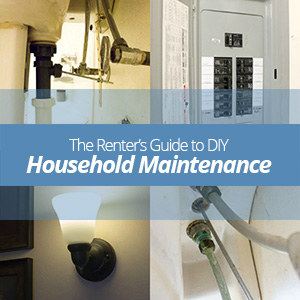One great thing about renting is that your landlord will usually fix major problems with your unit, plus you won’t be responsible for the cost. But the downside is being on your landlord’s timeline; if they are responsible for a lot of rental units, it might take a day or two (or more) until they can fix your issue. Luckily, if you’re willing to get your hands a little dirty, there are a lot of DIY options for fixing common household problems, and they’re a lot faster than waiting for the landlord!
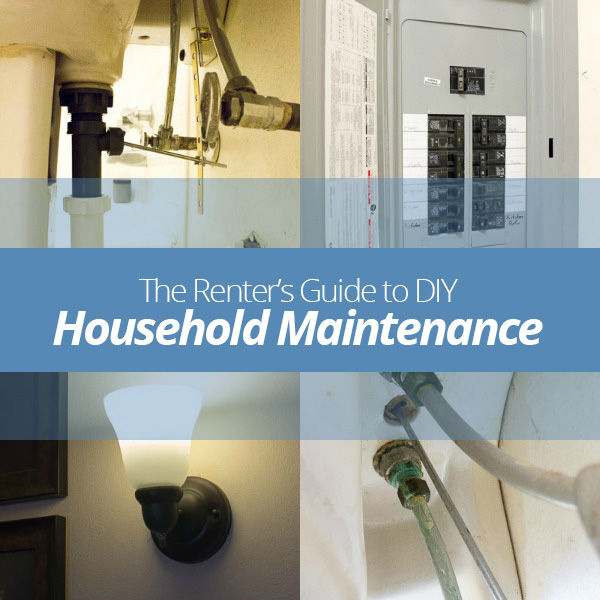
So today I’m bringing you the Renter’s Guide To DIY Household Maintenance: A list of common problems you may face, and how to know if you can fix them yourself or if you need to call the landlord!
The Renter’s Guide To DIY Household Maintenance
When you own your home, you’re pretty much on the hook for any issues that might come up, but if you rent, that responsibility is split between you and your landlord. Fixing the problems yourself can save you some time, especially if your landlord manages multiple units, but there are still situations where you’ll be better off calling the landlord and having them fix the issue.
Electrical issues:
Usually you are responsible for any burnt out light bulbs in your unit, and your landlord is responsible for burnt out bulbs in common areas like hallways or staircases. Luckily, light bulbs are easy to replace! However, if the light bulb is in a hard to reach area or you ever feel unsafe, just call the landlord to have them replace it!
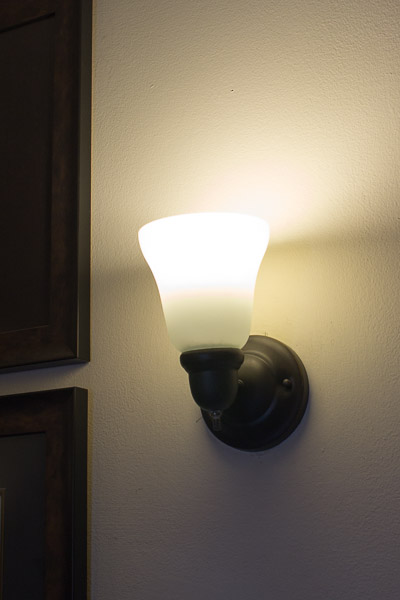
Another common electrical issue is a tripped circuit or a blown fuse (though most modern electrical systems don’t use fuses anymore). This happens when you overload an electrical circuit by plugging too many things in all at once or if there’s a storm that causes a power surge. Tripped circuits are very simple to fix, as long as you have access to your circuit breaker box. If your breaker box is in your unit somewhere (in a closet for example), just open the cover panel to access the circuit breakers.
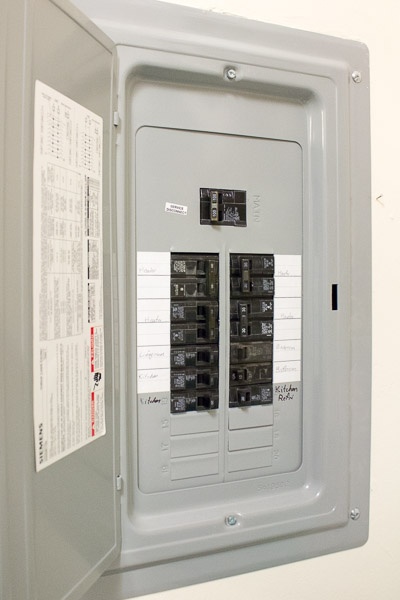
Usually when a circuit is tripped, the breaker physically moves to a different position; this makes it easy to tell which circuit has tripped because one breaker will not be in the same position as all the other ones. However, sometimes the breaker doesn’t actually move. If this is the case, you can still fix it by manually flipping the breaker “off” and then back “on” again. Hopefully your circuits are well labeled!
If you’re in an apartment building and there isn’t a breaker box in your unit, there is probably a common one out in a hallway or in the common laundry room. If you have a common breaker box, it is probably locked so that tenants can’t accidentally flip breakers for their neighbors. So just call your landlord and have them open the box and flip the breaker back to “on” for you.
Remember safety always comes first! Nearly every other electrical issue you might encounter other than a tripped circuit could be potentially dangerous and you should let your landlord handle it. Especially if you see sparks or frayed wires, call your landlord immediately and move to a safe location.
Plumbing issues:
Clogged drains are an annoying problem, but they can also get serious if they aren’t taken care of properly. If your drain is slow, you can try snaking the clog out with the end of a metal coat hanger or a pipe cleaner or something similar. We have a drain millipede (basically a really long, flexible, thick pipe cleaner with a handle) that works great for pulling small clogs up out of the drain.
Another option is using a liquid drain cleaner to attempt to dissolve your clog. But be careful; these cleaners are also very hard on your pipes and can stress them, causing them to crack or leak. (My lease specifically forbids the use of liquid drain cleaners, so check your lease before you use one!) And PVC pipes are even more susceptible to harm from a liquid drain cleaner, so be especially careful if your pipes aren’t metal!

If none of this works, you should probably call your landlord and have them actually snake the drain. Pipe snakes are designed to push the clog further down into the drainage system, past the small pipes right under your sink and into the larger pipes in the walls. But pipe snakes usually require that you remove the u-bend pipe and snake the drain from there, so unless you have experience snaking pipes, it’s probably best to let your landlord handle that.
Another common plumbing problem is leaky faucets or pipes. If your faucet is dripping slowly, you can usually fix that by tightening the nuts on the faucet handles underneath your sink. A big wrench should do the trick, just don’t over-tighten anything or it might crack the faucet or your porcelain sink. If tightening the nuts doesn’t fix the leak, call your landlord and have them look at it.
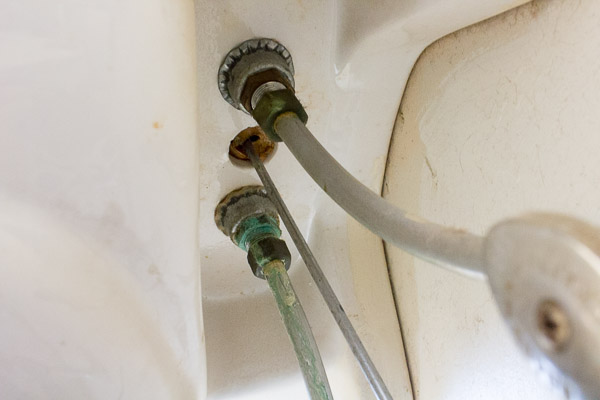
If you have pipes that are leaking, that’s a potentially bigger issue. If you have access to the pipe (i.e. it’s under the sink and not behind a wall) and it appears to be leaking at a joint, you can try to VERY gently tighten the nut at the joint and see if that fixes it. Don’t wrench too hard on the pipe or you could crack it.
If this doesn’t stop the leak, or if the pipe itself is cracked and leaking, call the landlord immediately. If water is spewing out of your pipes, start by turning off the water to those pipes before you call the landlord so you don’t get water damage. If you’re in an apartment, you should have individual shutoff valves underneath your sinks, behind your toilets, and near anywhere else a water pipe comes out of the wall. If you’re in a house or townhouse, you may have a larger shutoff valve in your basement or even out on the street. Turn the valves all the way to off to stop water from flowing through those pipes.

Appliance issues:
The general rule of thumb is if the appliance came with your rental unit, it’s your landlord’s responsibility to fix it. But there are some things you can do to help your larger appliances last longer. If you live in an area with hard water, clean your dishwasher regularly with vinegar to remove hard water buildup that could clog the spouts. You can vacuum behind your refrigerator and clean dust and dirt off of the coils so that it can cool more efficiently. If you have a washer and dryer in your unit, make sure to clean out your dryer vents often to keep them free of lint. If the pilot light in your gas oven goes out, you can usually relight it with a match. But if these appliances break, call your landlord. And if your microwave or window A/C unit is on the fritz and it’s something you brought with you, you probably need to fix it or replace it yourself.
Structural issues:
In general, structural issues are the landlord’s responsibility. If there are leaks in pipes behind the walls and you see water coming in through your walls or ceiling, call your landlord immediately. If there are cracks in your door jam and you can feel a draft coming in from outside, call your landlord. If a window is broken, call your landlord. In general, any major issues like these should be fixed by your landlord.
The only type of structural issue I would suggest attempting to fix yourself is something small and inside your unit, like a door that hangs crooked. If you have wonky doors that don’t close properly, it might be as simple as adjusting the hinges so the door hangs better. But a skewed door or door frame could also be a sign of a larger problem, like a sinking foundation or something similar. So if a quick adjustment doesn’t fix it, call your landlord!
Safety issues:
Never take chances with a potential safety issue; you should always call your landlord! Broken gas lines, heat not working in the middle of winter, broken locks, broken doors, and broken windows are all things that your landlord should take care of for you. If you notice any of these issues, call your landlord immediately and go somewhere safer until the landlord has a chance to fix the problem.
The only thing you should be responsible for in your unit is replacing batteries in your smoke detector or CO detector. But if the detectors aren’t working, even after you’ve replaced the batteries, call your landlord!


